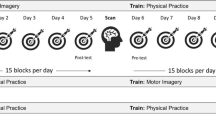Abstract
An investigation was carried out into the effect of imagery instructions on a simple motor skill accuracy task (putting a golf ball). Thirty college students were blocked on their putting ability and randomly assigned within blocks to one of three experimental conditions: (a) positive imagery, (b) negative imagery, and (c) control. Subjects in the two imagery conditions were given the identical instructions for imagining the backswing and putting stroke. In the positive imagery group, subjects imagined the ball going into the cup, while subjects using negative imagery visualized the ball narrowly missing the cup. Subjects in the control group putted without instructions. On each of 6 consecutive days a 10-putt trial was conducted for each subject. There was a significant main effect on performance improvement for the experimental manipulation. Post hoc analyses showed significant differences among all groups, with positive imagery producing the most improvement, the control condition producing less, and negative imagery resulting in performance deterioration. Results are discussed in relation to the existing literature, and future research directions are delineated.
Similar content being viewed by others
References
Eggleston, D. (1936).The relative value of actual versus imaginary practice in a learning situation. Unpublished master's thesis, Columbia University.
Epstein, M. L. (1980). The relationship of mental imagery and mental rehearsal to performance of a motor task.Journal of Sport Psychology, 2 211–220.
Feltz, D. L., & Landers, D. M. (1983). The effects of mental practice on motor skill learning and performance: A meta-analysis.Journal of Sport Psychology, 5 25–57.
Gentile, A. M. (1972). A working model of skill acquisition with application to teaching.Quest, 17 3–23.
Gould, D., Weinberg, R., & Jackson, A. (1980). Mental preparation strategies, cognitions and strength performance.Journal of Sport Psychology, 2 329–339.
Highlen, P. S., & Bennett, B. B. (1979). Psychological characteristics of successful and nonsuccessful elite wrestlers: An exploratory study.Journal of Sport Psychology, 1 123–137.
Johnston, J. E. (1971).The effects of imagery on learning the volleyball pass. Unpublished doctoral dissertation, Temple University.
Kirschenbaum, D. S., & Bale, R. M. (1980). Cognitive-behavioral skills in golf: Brain power golf. In R. M. Suinn (Ed.),Psychology in sports. Minneapolis: Burgess.
Mahoney, M. J., & Avener, M. (1977). The psychology of the elite athlete: An exploratory study.Cognitive Therapy and Research, 1 135–141.
McBride, E. R., & Rothstein, A. L. (1979). Mental and physical practice and the learning and retention of open and closed skills.Perceptual and Motor Skills, 49 359–365.
Meyers, A. W., Schleser, R., Cooke, C. J., & Cuvillier, C. (1979). Cognitive contributions to the development of gymnastics skills.Cognitive Therapy and Research, 3 75–85.
Nicklaus, J. W. (1981).Play better golf. New York: Pocket Books.
Perry, H. M. (1939). The relative efficiency of actual and imaginary practice in five selected tasks.Archives of Psychology, 34 5–75.
Powell, G. E. (1973). Negative and positive mental imagery in motor skill acquisition.Perceptual and Motor Skills, 37 312.
Silva, John M., III. (1982). Competitive sport environments: Performance enhancement through cognitive intervention.Behavior Modification, 6 443–464.
Weinberg, R. S., Gould, D., Jackson, A., & Barnes, P. (1980). Influence of cognitive strategies on tennis serves of players of high and low ability.Perceptual and Motor Skills, 50 63–66.
Author information
Authors and Affiliations
Rights and permissions
About this article
Cite this article
Woolfolk, R.L., Parrish, M.W. & Murphy, S.M. The effects of positive and negative imagery on motor skill performance. Cogn Ther Res 9, 335–341 (1985). https://doi.org/10.1007/BF01183852
Issue Date:
DOI: https://doi.org/10.1007/BF01183852




